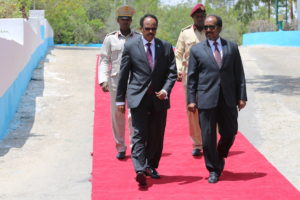By Faisal Roble
The year 1994 and 2017 have one thing in common: both years mark missed opportunities in remaking Somalia. Just like the time when the Algerian born former UN representative, Mohamed Sahnoun, narrated about Somalia’s missed opportunity, in 2017 we are witnessing the agony of Mohamed Farmajo being on the verge of throwing away a historical national mandate at his disposal.
On the eve of February 8, 2017, Somalis sung “maanta, maanta maanta waa maalin weyne maanta,” In droves, youth in tattered clothes and bare footed crisscrossed the dusty streets and dark alleys of Mogadishu and elsewhere to chant these majestic verses, a euphoric expression of patriotism to mark a rare moment to revive, or at least show their willingness to help remake, Somalia.

For a short but sweat moment, we basked in fond memories of bygone days, throwing us back to the days of hope, high spirit and huge expectations at the birth of the now collapsed state, defunct Maandeeq you may say. To be somewhat nostalgic, “maanta maanta…” united two spirits in two different times, one existing only in a distant memory and the other in the moment; in the other words, these are two periods simply tied together by a breakable thin string of hope. And “Farmaajo ii geeya” was the icing on the cake of momentous phenomenon – a potential comeback of Somalia, which once seemed within our reach.
Alas, President Mohamed Abdullahi Farmajo may have strayed for good and embarked on a familiar road of incompetency that leads Somali politicians to the inevitable hell hole of do-nothing icons occupying the historic Villa Somalia for a useless period for four years.
I am fearful that “Farmajo ii geeya,” a touchy phrase reflexively uttered by a spirited down trodden young man who hails from Somali Bantu, may as well have deteriorated to “Dhado roob noqon weyday,” or Farmajo’s promise became a mirage.
Somali masses have constantly proven to be patriotic, expressive in registering their hopes for a brighter day; but they have been conversely blessed with leaders that have constantly fallen short in skills to articulate a system of good governance that works. If Abba Eban painted Palestinian leaders as a cohort of consistently inconsistent fellows, Somali leaders have been constantly inconsistent about their delivery of good governance to their people. President Farmajo is no exception thus far and has proven to be in good company with those that came before him.
Why is it that Somali leaders cannot match the spirit of hope expressed by their masses with leadership capacity? Is it because that their pastoral culture is not conducive to governance but to the calculus of clan segmentation that drags the institution of governance to the gutters? Or, is it because the leaders on the political scene are not yet at a point where they can fully understand the mechanics of how to establish a functioning government that translates public spirits into practical policies?
I will not dwell on the merits or demerits of these two schools of thoughts as to why Somalis are constantly failing to have a good working government. However, I will highlight few incidents that place President Farmajo in the same camp as his predecessors.
The Self-undoing of Farmajo’s Hope
President Farmajo was given a mandate with an immense political capital on February 8, 2017; it was a mandate that should have enabled him to think out of the box, and go places that others did not venture into. He was in a position to have taken the risk to form a government that works for the reconstruction of the nation but at the same time defy clan calculus.
Unfortunately he failed to take the bull by its horns; he went for the easy and simple rout, thus forming the most bloated redundant government thus far.
Within weeks of being popularly elected by a parliament that wanted change, Mr. Farmajo quickly surrounded himself with old faces that served his predecessors. Almost all his handlers were either Ambassadors or high level functionaries of the government he had replaced. Yet, the public gave him a huge pass and never-seen-before benefit of the doubt. Social media went silent, support poured in, and critics refrained from criticizing him for weeks in the face of successive early signs of failures in his watch. All of us re calibrated our expectations and still managed to expand the room of error for him.
His second major action that threw many off balance was when he picked a less known Prime Minister, Hassan Khayre. Although some raised questions about Mr. Khayre’s association with shady deals regarding Somalia’s less sanguine oil deals, there was nothing legally proven to assail the new PM. Yet the fact that he never held public offices or run a private enterprise was a serious concern to many. However, his supporters emphasized the new PM’s long association with Western NGOs.
As we recall, former president Hassan Sheikh was in some circles referred to as the NGO president. Despite the often good work some NGOs do for the indigent Somalis, Mr. Khayre’s nomination truly divided the nation. I personally thought until now he had more to offer than otherwise. But his rational for commissioning the second largest cabinet in African history at this juncture and in the midst of the worst famine in Somalia’s history is no consolation to the nation. It is at best a charlatan work.
The meek leadership of Farmajo hit us in the belly when the president of Kenya on March 18, 2017 entered Somali territory without permission to tour and visit Kenyan troops inside Somalia and the entire administration kept silent kept silent. Many asked what had happened to the humbug promises and bravados surrounding “Somalia’s sovereignty” Farmajo the opposition always articulated. I vividly recall Mr. Farmajo criticizing Omar Abdirashid Sharmarke, former Prime Minister, on this very issue. In return, he will always promise to Somalis that he will soon bring back the “lost sovereignty.”

Looking at his cabinet structure, there are good and bad things. From selfish point of view, some of my good friends have key portfolios and I sincerely congratulate them in advance with a muted expectation from the administration they would be serving.
Outside that, there is an obvious lax and visible laziness shown in Farmajo’s effort to manage the huge expectations of millions of Somalis. After a long suspense and weeks of hopefulness for a smaller, streamlined and realigned government, president Farmajo and Prime Minister Khayre delivered the most anticlimactic list of cabinet members. It is too big and a function to satisfy clan calculous, thus a window from which to glean the core values of Villa Somalia. For example, close 50% of the cabinet seats are occupied by parliamentarians. Also, a good percentage represents recycled former functionaries of his predecessor’s administration. In addition, a handful of the list does not satisfy the criteria expressed in Article 98 of the draft constitution for selecting a competent minister. It is a cabinet rife with conflicts.
With the exception of Ghana, with it’s over hundred ministers, Somalia under Famajo boasts the second largest government with a bustling cabinet that consists of about 70 ministers. Whereas Ghana may be able to afford to pay its large portfolio through the revenue it collects from its gold resource, Somalia’s empty coffers will not by any stretch of the imagination be able to sustain such a bloated government.
The release of president Farmajo’s extra-large cabinet is a major blow to his capacity to organize a meaningful government. He has failed to use the political capital which the Somalis gave him. Some of his supporters may want to rationalize his actions on the complex nature of Somalia’s clan calculous. If we accept that rational, president Farmajo’s action vindicates his predecessors. If so, then why did Somalia need a change?
Advancing the clan rational and arguing that there is no other way to approach governance in Somalia axcept through the manipulation of the clan factor is an implicit admission that Somalia is a federation of clans, and not a nation state, an argument some of us totally reject. It is indeed an argument that also vindicated Lord Luggard’s approach to Somali British protectorate which based its rule of Somalis on the same clan based rational for administering and apportioning benefits based on clan concept.
If Somalis want to foster a modern nation state, they need not create excuses for the failure of their leaders to never move away from satisfying the very social institution that has consumed everything that was good about their society. There has to be a better model to rebuild Somalia.
On February 8, 2017, president Farmajo was given the one powerful tool, political mandate, to invoke a new to defy clan calculations and rebuild Somalia afresh. Unfortunately, he failed to harness such an immense political capital and instead gravitated back to the hell hole that he felt comfortable. Just like in the past, he missed an opportunity to re-imagine Somalia. Unless he changes course, which is unlikely, his legitimacy and the short-lived mandate he had until recently may not come back to him.
Faisal Roble
Email:[email protected]
—
Faisal Roble, a writer, political analyst and a former Editor-in-Chief of WardheerNews, is mainly interested in the Horn of Africa region. He is currently the Principal Planner for the City of Los Angeles in charge of Master Planning, Economic Development and Project Implementation Division.
We welcome the submission of all articles for possible publication on WardheerNews.com. WardheerNews will only consider articles sent exclusively. Please email your article today . Opinions expressed in this article are those of the author and do not necessarily reflect the views of WardheerNews.
WardheerNew’s tolerance platform is engaging with diversity of opinion, political ideology and self-expression. Tolerance is a necessary ingredient for creativity and civility.Tolerance fuels tenacity and audacity.
WardheerNews waxay tixgelin gaara siinaysaa maqaaladaha sida gaarka ah loogu soo diro ee aan lagu daabicin goobo kale. Maqaalkani wuxuu ka turjumayaa aragtida Qoraaga loomana fasiran karo tan WardheerNews.
Copyright © 2024 WardheerNews, All rights reserved


